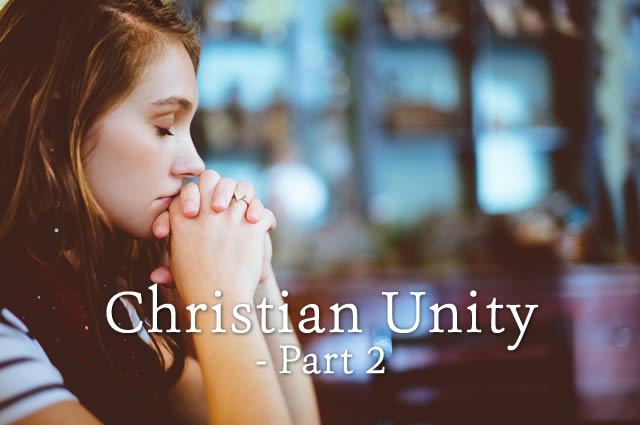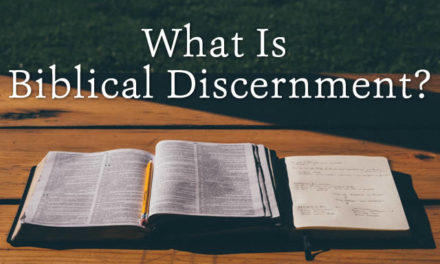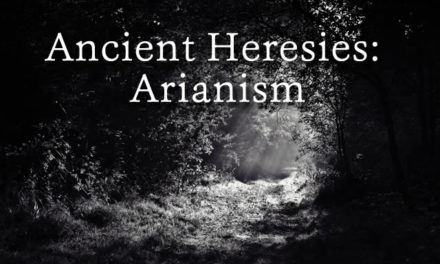Part 2
“Now I beseech you, brethren, by the name of our Lord Jesus Christ, that ye all speak the same thing, and that there be no divisions among you; but that ye be perfectly joined together in the same mind and in the same judgment”
1 Corinthians 1:10
Visible Unity
– Organizational and Doctrinal
In our last article we discussed two aspects of unity common in the cults, organizational and doctrinal unity. These are the visible and external manifestations of unity, but they are not the base of Christian unity. Organizational and doctrinal unity is something men can achieve, as cults try to demonstrate for the sake of image. Unity in high control groups emphasizes how things appear as more important than how they really are.
The original followers of Joseph Smith or Charles Taze Russell would not agree doctrinally with the present followers of the groups they founded. When someone is caught disagreeing with the doctrine of the cult today they are immediately disciplined, or expelled. This immediate action cuts the potential losses by limiting the spread of an idea that competes with the orthodoxy of the cult.
The substance of real unity eludes groups with a cultic mindset. Forced unity maintains an image by using legalistic and destructive methods that are in conflict with biblical ethics. It was this false image based upon man’s methods that Jesus called “whited sepulchers” (Matthew 23).
A Better Alternative
– Spiritual Unity
The basis upon which Christians are united is spiritual in nature. There is a unity that exists among born again believers that transcends anything that man can do to unite or disunite. It begins with the indwelling Holy Spirit in all believers Who unites us as one. Jesus said, “I will pray the Father, and He shall give you another Comforter, that He may abide with you forever . . . I will not leave you comfortless: I will come to you … At that day ye shall know that I am in My Father, and ye in Me, and I in you” (John 14:16,18,20). Our unity exists in God Who is One, is in us, and we in Him. And the Holy Spirit is working in us to carry out God’s purposes for us. And thereafter, as we obey the Spirit, will follow the visible manifestations of a unity of doctrine and organization.
Paul spoke of this kind of unity in Colossians 3:11 when he said, “Where there is neither Greek nor Jew, circumcision nor uncircumcision, Barbarian, Scythian, bond nor free: but Christ is all, and in all.” In our modern context we might say there is neither Baptist, nor Methodist, Southern conservative nor New England liberal, American nor Frenchman.
God is bigger than our smallness and limited perspective. God is absolute truth and it is our duty to be faithful to that truth. But God is also love, and in our obedience to His truth we must also exhibit His love.
But even when indwelled by God’s Spirit, we are still subject to our human weaknesses that lead us to disunity. It is this sinful tendency to selfishness and pride that leads to the disunity that the Apostle Paul addresses in Ephesians 4.
“I therefore, the prisoner of the Lord, beseech you that ye walk worthy of the vocation wherewith ye are called, with all lowliness and meekness, with longsuffering, forbearing one another in love; Endeavoring to keep the unity of the Spirit in the bond of peace. There is one body, and one Spirit, even as ye are called in one hope of your calling; One Lord, one faith, one baptism, One God and Father of all, who is above all, and through all, and in you all.”
From this passage you see Paul saying we are to “endeavor” to be united. The endeavoring is commanded, not the unity. Then he points out the doctrinal foundation upon which we are to be united, a foundation that is basic, and that does not list those doctrines that are peripheral.
Acts 15 – A “Church Fight?”
A good example in the New Testament of a “church fight” is found in Acts 15. The Antioch church was a mixture of Gentiles and Jews who had become Christians. The Jews found it difficult to accept that the Gentiles ate meat that had been offered to idols, or had not been properly bled. The Gentiles wondered if their Christian faith meant that they had to keep the Old Testament laws on such things. Paul took the contending sides to a Council in Jerusalem.
Attitude Is Key
The resolution to the conflict involved give and take on both side. The issue was the unity of a church over things that were cultural to one side and not commanded by God to the other. A compromise was reached that allowed both sides to go forward as one for the sake of the gospel.
The Gentiles had a right under the New Covenant to resist taking up the Jewish traditions. And the Jewish believers had a right to observe many of the Old Covenant traditions that were not in conflict with the New Covenant. However, both sides also had the responsibility of unity. And it was in this sense of responsibility that rights were set aside. That is spiritual maturity.
The resolution of any such conflict requires a certain attitude on the part of the contenders. It is the “new man” Paul speaks of in Colossians 3 that puts off the “old man” in favor of the selfless attitude of Christ. That attitude involves mercy, kindness, humbleness, meekness, longsuffering, forbearance, and forgiveness (vss. 12-14). The primary goal must be peace and fellowship when all is said and done. Absent this attitude one side will win at the expense of the other and unity will be lost.
When Unity Cannot Be Achieved
Although no doctrine is unimportant, there are certain doctrines that are important, more important, and most important. While unity is always the goal there are some issues that will inevitably cause Christians to separate. Some divisions will be the result of conscience regarding less important teachings and others will be over issues such as the foundational doctrines of the faith as Paul outlined above.
Of supreme importance is the Person and work of Jesus Christ. The Second Person of the Trinity offered Himself as a sacrifice to atone for our sin and satisfy God’s holiness and justice. To compromise these two doctrines is to destroy the gospel. In the face of such a compromise a Christian must separate himself from those who would deny this truth.
An issue that may involve the individual’s conscience can be illustrated by the following. A Jewish believer in the first century has a conscience which tells him he cannot eat meat that has been offered to idols, or is unbled. It is likely he will have a crisis of conscience if he attends a meal with a Gentile believer who serves meat that had been offered to an idol. His cultural heritage as a Jew has conditioned him to respond in a way that is not easily forsaken.
In the Old Testament such foods were forbidden to a Jew but in the New Covenant they are not. As Paul says, “Not that which goeth into the mouth that defileth a man; but that which cometh out of the mouth, this defileth a man” (Matthew 15:9).
So unbled meats, or meat offered to an idol, which is “nothing” (1 Corinthians 8:4) according to Paul, is something to which the Jewish believers had to adjust under the New Covenant. Paul tells us that our conscience is to govern us in such situations, and we know that our conscience can be trained according to our knowledge of the truth. The Jewish believer has not yet re-educated his conscience to accept this Gentile practice of eating meat forbidden to an orthodox Jew.
On the other hand, the Gentile believer must be sensitive to the potential for offense in offering a meal of hitherto forbidden foods to a Jewish Christian. We try to always keep this concern in mind when we offer meals in our home to a friend who is of the Muslim faith, which, like Jewish belief, avoids pork products.
Structure Helps
Returning to the scenario in Acts 15, the Jews perhaps thought they had the weight of scripture on their side. But that was answered by the claims of the New Covenant where many of the Old Covenant prohibitions were not renewed. Each side had their “authoritative” arguments. Paul brought the two sides to a third party with authority to decide the matter, the Council in Jerusalem. The decision was a compromise that had application only to that situation but taught a lesson that lasts to this day.
Christians are not obligated to observe all the abstentions named in Acts 15. Today we can eat meat that is unbled, or has been offered to an idol if our conscience is not offended. However, in Romans 14 Paul discusses in great detail what our attitude should be about such rights and privileges. The lesson for us is spelled out in the Christian virtues of grace, forbearance, mercy, esteeming the other better than oneself, love, etc. What chance has anger, divisiveness, and selfishness when these virtues are operating on both sides of a dispute?
A Christian must obey scripture and his conscience but that necessity does not mean he must be hostile to his Christian brother. Christians who differ must still love one another while recognizing that they have a difference they cannot negotiate, or ignore. Mundane disagreements can lead to alienation with a brother because our emotions have become invested and we don’t want to lose in the eyes of others.
It is also wrong to try to force, or otherwise encourage, a doctrinal and organizational unity that nullifies the individual’s conscience on less important doctrine and practice. To make organizational or doctrinal unity the goal can be destructive of true unity. Man-made constructs do not recognize the God-made reality via the indwelling Spirit.
Adam Clarke said, “On every essential doctrine of the Gospel all genuine Christians agree: why then need religious communion be interrupted? This general agreement is all that the apostle can have in view; for it cannot be expected that any number of men should in every respect perfectly coincide in their views of all the minor points, on which an exact conformity in sentiment is impossible to minds so variously constituted as those of the human race. Angels may thus agree, who see nothing through an imperfect or false medium; but to man this is impossible. Therefore men should bear with each other, and not be so ready to imagine that none have the truth of God but they and their party” (Clarke’s Commentary, Vol. VI, page 192).
Conclusion
Unity begins with an attitude, and that is the virtue of selflessness. Then it is principled and mature. The wisdom to discern between a petty threat to unity as opposed to an important principle, or doctrine, is like a fork in the road where a decision must be made to take one direction, or another. In the case of those taking the wrong fork toward strife and disunity the Bible says we must regard them in a certain way. Paul said in Romans 16:17 to “…mark them which cause divisions and offenses…and avoid them.” This is a strong response to schismatics.
However, for taking the opposite fork in the road Jesus said, “Blessed are the peacemakers, for they shall be called the children of God” (Matthew 5:9). And again, Paul says, “Repay no one evil for evil. Have regard for good things in the sight of all men. If it is possible, as much as depends on you, live peaceably with all men” (Romans 12:17, 18).
If division must come then let it be for the sake of the gospel and conscience, not for the sake of personal preferences and petty disputes.
By David Henke






